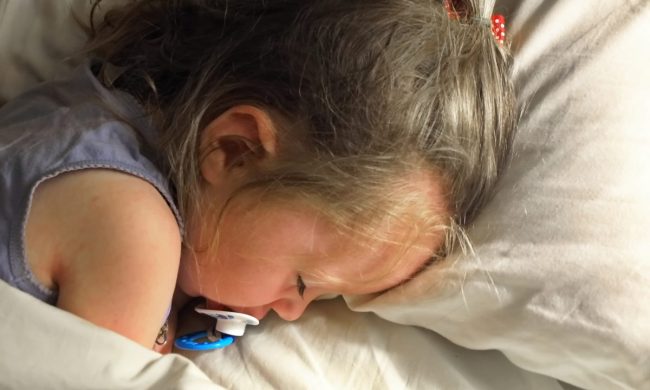You know your toddler is tired. They’re fussy, crying, and fighting it with all their might. Your toddler’s favorite word seems to be “No!” especially at bedtime.
Does this sound familiar?
It’s not uncommon with toddlers. Being tucked in and going to bed seems like the end of the world to them sometimes — and it’s actually normal. Many toddlers fight or stall when it’s time to go to bed. But why? And what can you as a parent do about it? Are there worthwhile solutions to toddlers’ sleeping behaviors?
Let’s dive deep into this issue so you can finally get your little one to bed, sleeping soundly.

Why toddlers fight sleep (or don’t sleep through the night)
Bedtime is usually not a toddler’s favorite time of day. Having to settle down and fall asleep can be a challenge for them. But why? There are many reasons your toddler might be fighting sleep at bedtime and not sleeping through the night.
• Your toddler is afraid
Things in a toddler’s universe can be scary. Something you don’t think twice about — the air conditioning kicking on, thunder during a storm, or the neighbor’s dog barking outside — can be enough to terrify your little one.
If a toddler starts associating bedtime with being afraid, it can be challenging to help them fall asleep.
• The timing is wrong
Believe it or not, you could be putting your toddler to bed too early. Toddlers need about 10-12 hours of sleep at night. During the day, they should sleep for about 1-2 hours at naptime. If their daily nap runs too late or they get off schedule another way, they might not be ready for bed at their usual time.
Also, if your toddler is more of an early riser and tends to wake up around 5 or 6 a.m., putting them to bed later usually won’t help them sleep later. You’ll have to get used to their schedule, even if that means getting up early.
• Your toddler is too excited
You should have a bedtime routine for your toddler that includes plenty of quiet time before bedtime so they don’t get too wound up. However, sometimes toddlers are just too excited. Either they’re overexcited from play before bedtime, or they’ve just eaten something sugary or caffeinated. Either way, even if they’re tired, they’ve got too much energy and won’t want to go to sleep.
• They’re feeling left out
This is a big reason, especially if you have a family with older kids or pets. Often when toddlers are tucked in, they can hear their parents, siblings, and sometimes pets moving around and making noise.
Even though you might just be balancing your checkbook while watching a soap, all your toddler is thinking about is how much fun the family is having without them. Naturally, your little one will want to crawl out of bed to see what’s going on.
• External factors are the problem
Of course, other things could be bothering your toddler that they can’t entirely communicate to you yet. Some examples include bright light streaming through their bedroom window, the room temperature is too hot or cold, loud noises, teething, or they don’t feel good.
Even eating dinner too late (or too early) can be a cause for a whiny toddler at bedtime.
• Your toddler is used to more coddling
Your toddler could also just be more used to falling asleep with your help. If you used to rock them to sleep or held them until they fell asleep in the past, that’s what they might be expecting. Toddlers who are more used to coddling need help to transition to falling asleep on their own.
It could be one of these reasons or all of the reasons. Regardless, it helps to identify the problem so you can work to solve it.
How you can help your toddler get a good night’s sleep
Luckily, there are plenty of things you can do to help your toddler get a good night’s sleep. We’ll focus on two main ways you can help.
• Make sure they have a bedtime routine
If your toddler doesn’t already have a bedtime routine, that could be the problem right there. For example, a bedtime routine could look like this:
o An hour before bed, you’ll give them a warm bath and brush their teeth.
o You’ll then dress them in their pajamas and change their diaper.
o Take them to the bathroom before getting into bed.
o Have some quiet time before kissing them goodnight.

• Don’t let them eat sugar or caffeine before bed
Toddlers shouldn’t eat sugar or caffeine before bed, and most parents know this. However, it can be tricky when you don’t realize what they’re eating or drinking is a source of sugar or caffeine. Chocolate, gummies, juice, sweet tea, and even cold medicine can give them a boost of energy.


